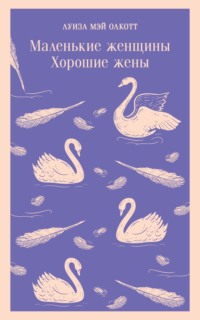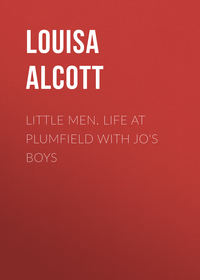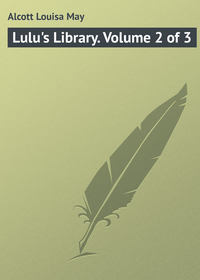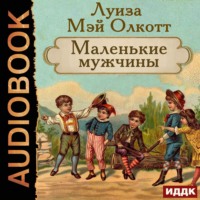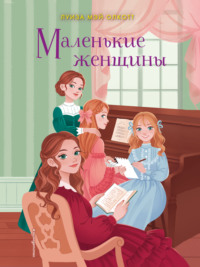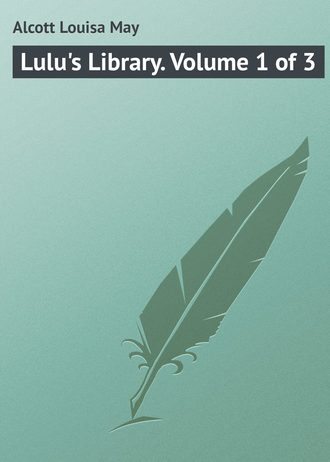 полная версия
полная версияLulu's Library. Volume 1 of 3
"Now, my precious, look and see how you and your dear ma have made a merry Christmas for them that needed it!"
Off went the bandage; and for a minute Effie really did think she was asleep again, for she actually stood in "a grove of Christmas trees," all gay and shining as in her vision. Twelve on a side, in two rows down the room, stood the little pines, each on its low table; and behind Effie a taller one rose to the roof, hung with wreaths of popcorn, apples, oranges, horns of candy, and cakes of all sorts, from sugary hearts to gingerbread Jumbos. On the smaller trees she saw many of her own discarded toys and those Nursey bought, as well as heaps that seemed to have rained down straight from that delightful Christmas country where she felt as if she was again.
"How splendid! Who is it for? What is that noise? Where is mamma?" cried Effie, pale with pleasure and surprise, as she stood looking down the brilliant little street from her high place.
Before Nurse could answer, the doors at the lower end flew open, and in marched twenty-four little blue-gowned orphan girls, singing sweetly, until amazement changed the song to cries of joy and wonder as the shining spectacle appeared. While they stood staring with round eyes at the wilderness of pretty things about them, mamma stepped up beside Effie, and holding her hand fast to give her courage, told the story of the dream in a few simple words, ending in this way: -
"So my little girl wanted to be a Christmas spirit too, and make this a happy day for those who had not as many pleasures and comforts as she has. She likes surprises, and we planned this for you all. She shall play the good fairy, and give each of you something from this tree, after which every one will find her own name on a small tree, and can go to enjoy it in her own way. March by, my dears, and let us fill your hands."
Nobody told them to do it, but all the hands were clapped heartily before a single child stirred; then one by one they came to look up wonderingly at the pretty giver of the feast as she leaned down to offer them great yellow oranges, red apples, bunches of grapes, bonbons, and cakes, till all were gone, and a double row of smiling faces turned toward her as the children filed back to their places in the orderly way they had been taught.
Then each was led to her own tree by the good ladies who had helped mamma with all their hearts; and the happy hubbub that arose would have satisfied even Santa Claus himself, – shrieks of joy, dances of delight, laughter and tears (for some tender little things could not bear so much pleasure at once, and sobbed with mouths full of candy and hands full of toys). How they ran to show one another the new treasures! how they peeped and tasted, pulled and pinched, until the air was full of queer noises, the floor covered with papers, and the little trees left bare of all but candles!
"I don't think heaven can be any gooder than this," sighed one small girl, as she looked about her in a blissful maze, holding her full apron with one hand, while she luxuriously carried sugar-plums to her mouth with the other.
"Is that a truly angel up there?" asked another, fascinated by the little white figure with the wreath on its shining hair, who in some mysterious way had been the cause of all this merry-making.
"I wish I dared to go and kiss her for this splendid party," said a lame child, leaning on her crutch, as she stood near the steps, wondering how it seemed to sit in a mother's lap, as Effie was doing, while she watched the happy scene before her.
Effie heard her, and remembering Tiny Tim, ran down and put her arms about the pale child, kissing the wistful face, as she said sweetly, "You may; but mamma deserves the thanks. She did it all; I only dreamed about it."
Lame Katy felt as if "a truly angel" was embracing her, and could only stammer out her thanks, while the other children ran to see the pretty spirit, and touch her soft dress, until she stood in a crowd of blue gowns laughing as they held up their gifts for her to see and admire.
Mamma leaned down and whispered one word to the older girls; and suddenly they all took hands to dance round Effie, singing as they skipped.
It was a pretty sight, and the ladies found it hard to break up the happy revel; but it was late for small people, and too much fun is a mistake. So the girls fell into line, and marched before Effie and mamma again, to say good-night with such grateful little faces that the eyes of those who looked grew dim with tears. Mamma kissed every one; and many a hungry childish heart felt as if the touch of those tender lips was their best gift. Effie shook so many small hands that her own tingled; and when Katy came she pressed a small doll into Effie's hand, whispering, "You did n't have a single present, and we had lots. Do keep that; it's the prettiest thing I got."
"I will," answered Effie, and held it fast until the last smiling face was gone, the surprise all over, and she safe in her own bed, too tired and happy for anything but sleep.
"Mamma, it was a beautiful surprise, and I thank you so much! I don't see how you did it; but I like it best of all the Christmases I ever had, and mean to make one every year. I had my splendid big present, and here is the dear little one to keep for love of poor Katy; so even that part of my wish came true."
And Effie fell asleep with a happy smile on her lips, her one humble gift still in her hand, and a new love for Christmas in her heart that never changed through a long life spent in doing good.
II.
THE CANDY COUNTRY
"I shall take mamma's red sun-umbrella, it is so warm, and none of the children at school will have one like it," said Lily, one day, as she went through the hall.
"The wind is very high; I 'm afraid you 'll be blown away if you carry that big thing," called Nurse from the window, as the red umbrella went bobbing down the garden walk with a small girl under it.
"I wish it would; I always wanted to go up in a balloon," answered Lily, as she struggled out of the gate.
She got on very well till she came to the bridge and stopped to look over the railing at the water running by so fast, and the turtles sunning themselves on the rocks. Lily was fond of throwing stones at them; it was so funny to watch them tumble, heels over head, splash into the water. Now, when she saw three big fellows close by, she stooped for a stone, and just at that minute a gale of wind nearly took the umbrella out of her hand. She clutched it fast; and away she went like a thistle-down, right up in the air, over river and hill, houses and trees, faster and faster, till her head spun round, her breath was all gone, and she had to let go. The dear red umbrella flew away like a leaf; and Lily fell down, down, till she went crash into a tree which grew in such a curious place that she forgot her fright as she sat looking about her, wondering what part of the world it could be.
The tree looked as if made of glass or colored sugar; for she could see through the red cherries, the green leaves, and the brown branches. An agreeable smell met her nose; and she said at once, as any child would, "I smell candy!" She picked a cherry and ate it. Oh, how good it was! – all sugar and no stone. The next discovery was such a delightful one that she nearly fell off her perch; for by touching her tongue here and there, she found that the whole tree was made of candy. Think what fun to sit and break off twigs of barley sugar, candied cherries, and leaves that tasted like peppermint and sassafras!
Lily rocked and ate till she finished the top of the little tree; then she climbed down and strolled along, making more surprising and agreeable discoveries as she went.
What looked like snow under her feet was white sugar; the rocks were lumps of chocolate, the flowers of all colors and tastes; and every sort of fruit grew on these delightful trees. Little white houses soon appeared; and here lived the dainty candy-people, all made of the best sugar, and painted to look like real people. Dear little men and women, looking as if they had stepped off of wedding cakes and bonbons, went about in their gay sugar clothes, laughing and talking in the sweetest voices. Bits of babies rocked in open-work cradles, and sugar boys and girls played with sugar toys in the most natural way. Carriages rolled along the jujube streets, drawn by the red and yellow barley horses we all love so well; cows fed in the green fields, and sugar birds sang in the trees.
Lily listened, and in a moment she understood what the song said, -
"Sweet! Sweet!Come, come and eat.Dear little girlsWith yellow curls;For here you 'll findSweets to your mind.On every treeSugar-plums you 'll see;In every dellGrows the caramel.Over every wallGum-drops fall;Molasses flowsWhere our river goes.Under your feetLies sugar sweet;Over your headGrow almonds red.Our lily and roseAre not for the nose;Our flowers we pluckTo eat or suck.And, oh! what blissWhen two friends kiss,For they honey sipFrom lip to lip!And all you meet,In house or street,At work or play,Sweethearts are they.So, little dear,Pray feel no fear:Go where you will;Eat, eat your fill.Here is a feastFrom west to east;And you can say,Ere you go away,'At last I standIn dear Candy-land,And no more can stuff;For once I 've enough.'Sweet! Sweet!Tweet! Tweet!Tweedle-dee!Tweedle-dee!""That is the most interesting song I ever heard," said Lily, clapping her sticky hands and dancing along toward a fine palace of white cream candy, with pillars of striped peppermint stick, and a roof of frosting that made it look like the Milan Cathedral.
"I 'll live here, and eat candy all day long, with no tiresome school or patchwork to spoil my fun," said Lily.
So she ran up the chocolate steps into the pretty rooms, where all the chairs and tables were of different colored candies, and the beds of spun sugar. A fountain of lemonade supplied drink; and floors of ice-cream that never melted kept people and things from sticking together, as they would have done had it been warm.
For a long while Lily was quite happy, going about tasting so many different kinds of sweeties, talking to the little people, who were very amiable, and finding out curious things about them and their country.
The babies were made of plain sugar, but the grown people had different flavors. The young ladies were flavored with violet, rose, and orange; the gentlemen were apt to have cordials of some sort inside of them, as she found when she ate one now and then slyly, and got her tongue bitten by the hot, strong taste as a punishment. The old people tasted of peppermint, clove, and such comfortable things, good for pain; but the old maids had lemon, hoarhound, flag-root, and all sorts of sour, bitter things in them, and did not get eaten much. Lily soon learned to know the characters of her new friends by a single taste, and some she never touched but once. The dear babies melted in her mouth, and the delicately flavored young ladies she was very fond of. Dr. Ginger was called to her more than once when so much candy made her teeth ache, and she found him a very hot-tempered little man; but he stopped the pain, so she was glad to see him.
A lime-drop boy and a little pink checker-berry girl were her favorite playmates; and they had fine times making mud-pies by scraping the chocolate rocks and mixing this dust with honey from the wells near by. These they could eat; and Lily thought this much better than throwing away the pies, as she had to do at home. They had candy-pulls very often, and made swings of long loops of molasses candy, and bird's-nests with almond eggs, out of which came birds who sang sweetly. They played football with big bull's-eyes, sailed in sugar boats on lakes of syrup, fished in rivers of molasses, and rode the barley horses all over the country.
Lily discovered that it never rained, but snowed white sugar. There was no sun, as it would have been too hot; but a large yellow lozenge made a nice moon, and red and white comfits were the stars.
The people all lived on sugar, and never quarrelled. No one was ill; and if any got broken, as sometimes happened with such brittle creatures, they just stuck the parts together and were all right again. The way they grew old was to get thinner and thinner till there was danger of their vanishing. Then the friends of the old person put him in a neat coffin, and carried him to the great golden urn which stood in their largest temple, always full of a certain fine syrup; and here he was dipped and dipped till he was stout and strong again, and went home to enjoy himself for a long time as good as new.
This was very interesting to Lily, and she went to many funerals. But the weddings were better still; for the lovely white brides were so sweet Lily longed to eat them. The feasts were delicious; and everybody went in their best clothes, and danced at the ball till they got so warm half-a-dozen would stick together and have to be taken to the ice-cream room to cool off. Then the little pair would drive away in a fine carriage with white horses to a new palace in some other part of the country, and Lily would have another pleasant place to visit.
But by and by, when she had seen everything, and eaten so much sweet stuff that at last she longed for plain bread and butter, she began to get cross, as children always do when they live on candy; and the little people wished she would go away, for they were afraid of her. No wonder, when she would catch up a dear sugar baby and eat him, or break some respectable old grandmamma all into bits because she reproved her for naughty ways. Lily calmly sat down on the biggest church, crushing it flat, and even tried to poke the moon out of the sky in a pet one day. The king ordered her to go home; but she said, "I won't!" and bit his head off, crown and all.
Such a wail went up at this awful deed that she ran away out of the city, fearing some one would put poison in her candy, since she had no other food.
"I suppose I shall get somewhere if I keep walking; and I can't starve, though I hate the sight of this horrid stuff," she said to herself, as she hurried over the mountains of Gibraltar Rock that divided the city of Saccharissa from the great desert of brown sugar that lay beyond.
Lily marched bravely on for a long time, and saw at last a great smoke in the sky, smelt a spicy smell, and felt a hot wind blowing toward her.
"I wonder if there are sugar savages here, roasting and eating some poor traveller like me," she said, thinking of Robinson Crusoe and other wanderers in strange lands.
She crept carefully along till she saw a settlement of little huts very like mushrooms, for they were made of cookies set on lumps of the brown sugar; and queer people, looking as if made of gingerbread, were working very busily round several stoves which seemed to bake at a great rate.
"I'll creep nearer and see what sort of people they are before I show myself," said Lily, going into a grove of spice-trees, and sitting down on a stone which proved to be the plummy sort of cake we used to call Brighton Rock.
Presently one of the tallest men came striding toward the trees with a pan, evidently after spice; and before she could run, he saw Lily.
"Hollo, what do you want?" he asked, staring at her with his black currant eyes, while he briskly picked the bark off a cinnamon-tree.
"I'm travelling, and would like to know what place this is, if you please," answered Lily, very politely, being a little frightened.
"Cake-land. Where do you come from?" asked the gingerbread man, in a crisp tone of voice.
"I was blown into the Candy country, and have been there a long time; but I got tired of it, and ran away to find something better."
"Sensible child!" and the man smiled till Lily thought his cheeks would crumble. "You'll get on better here with us Brownies than with the lazy Bonbons, who never work and are all for show. They won't own us, though we are all related through our grandparents Sugar and Molasses. We are busy folks; so they turn up their noses and don't speak when we meet at parties. Poor creatures, silly and sweet and unsubstantial! I pity 'em."
"Could I make you a visit? I'd like to see how you live, and what you do. I 'm sure it must be interesting," said Lily, picking herself up after a tumble, having eaten nearly all the stone, she was so hungry.
"I know you will. Come on! I can talk while I work." And the funny gingerbread man trotted off toward his kitchen, full of pans, rolling-pins, and molasses jugs.
"Sit down. I shall be at leisure as soon as this batch is baked. There are still some wise people down below who like gingerbread, and I have my hands full," he said, dashing about, stirring, rolling out, and slapping the brown dough into pans, which he whisked into the oven and out again so fast that Lily knew there must be magic about it somewhere.
Every now and then he threw her a delicious cooky warm from the oven. She liked the queer fellow, and presently began to talk, being very curious about this country.
"What is your name, sir?"
"Ginger Snap."
Lily thought it a good one; for he was very quick, and she fancied he could be short and sharp if he liked.
"Where does all this cake go to?" she asked, after watching the other kitchens full of workers, who were all of different kinds of cake, and each set of cooks made its own sort.
"I 'll show you by and by," answered Snap, beginning to pile up the heaps of gingerbread on a little car that ran along a track leading to some unknown storeroom, Lily thought.
"Don't you get tired of doing this all the time?"
"Yes; but I want to be promoted, and I never shall be till I 've done my best, and won the prize here."
"Oh, tell me about it! What is the prize, and how are you promoted? Is this a cooking-school?"
"Yes; the prize for best gingerbread is a cake of condensed yeast. That puts a soul into me, and I begin to rise till I am able to go over the hills yonder into the blessed land of bread, and be one of the happy creatures who are always wholesome, always needed, and without which the world below would be in a bad way."
"Bless me! that is the queerest thing I Ve heard yet. But I don't wonder you want to go; I 'm tired of sweets myself, and long for a good piece of bread, though I used to want cake and candy at home."
"Ah, my dear, you 'll learn a good deal here; and you are lucky not to have got into the clutches of Giant Dyspepsia, who always gets people if they eat too much of such rubbish and scorn wholesome bread. I leave my ginger behind when I go, and get white and round and beautiful, as you will see. The Gingerbread family have never been as foolish as some of the other cakes. Wedding is the worst; such extravagance in the way of wine and spice and fruit I never saw, and such a mess to eat when it's done! I don't wonder people get sick; serves 'em right." And Snap flung down a pan with such a bang that it made Lily jump.
"Sponge cake is n't bad, is it? Mamma lets me eat it, but I like frosted pound better," she said, looking over to the next kitchen, where piles of that sort of cake were being iced.
"Poor stuff. No substance. Ladies' fingers will do for babies, but pound has too much butter ever to be healthy. Let it alone, and eat cookies or seed-cakes, my dear. Now, come along; I'm ready." And Snap trundled away his car-load at a great pace.
Lily ran behind to pick up whatever fell, and looked about her as she went, for this was certainly a very queer country. Lakes of eggs all beaten up, and hot springs of saleratus foamed here and there ready for use. The earth was brown sugar or ground spice; and the only fruits were raisins, dried currants, citron, and lemon peel. It was a very busy place; for every one cooked all the time, and never failed and never seemed tired, though they got so hot that they only wore sheets of paper for clothes. There were piles of it to put over the cake, so that it shouldn't burn; and they made cook's white caps and aprons of it, and looked very nice. A large clock made of a flat pancake, with cloves to mark the hours and two toothpicks for hands, showed them how long to bake things; and in one place an ice wall was built round a lake of butter, which they cut in lumps as they wanted it.
"Here we are. Now, stand away while I pitch 'em down," said Snap, stopping at last before a hole in the ground where a dumbwaiter hung ready, with a name over it.
There were many holes all round, and many waiters, each with its name; and Lily was amazed when she read "Weber," "Copeland," "Dooling," and others, which she knew very well.
Over Snap's place was the name "Newmarch;" and Lily said, "Why, that's where mamma gets her hard gingerbread, and Weber's is where we go for ice-cream. Do you make cake for them?"
"Yes, but no one knows it. It's one of the secrets of the trade. We cook for all the confectioners, and people think the good things come out of the cellars under their saloons. Good joke, is n't it?" And Snap laughed till a crack came in his neck and made him cough.
Lily was so surprised she sat down on a warm queen's cake that happened to be near, and watched Snap send down load after load of gingerbread to be eaten by children, who would have liked it much better if they had only known where it came from, as she did.
As she sat, the clatter of many spoons, the smell of many dinners, and the sound of many voices calling, "One vanilla, two strawberries, and a Charlotte Russe," "Three stews, cup coffee, dry toast," "Roast chicken and apple without," came up the next hole, which was marked "Copeland."
"Dear me! it seems as if I was there," said Lily, longing to hop down, but afraid of the bump at the other end.
"I 'm done. Come along, I 'll ride you back," called Snap, tossing the last cooky after the dumb-waiter as it went slowly out of sight with its spicy load.
"I wish you 'd teach me to cook. It looks great fun, and mamma wants me to learn; only our cook hates to have me mess round, and is so cross that I don't like to try at home," said Lily, as she went trundling back.
"Better wait till you get to Bread-land, and learn to make that. It's a great art, and worth knowing. Don't waste your time on cake, though plain gingerbread is n't bad to have in the house. I 'll teach you that in a jiffy, if the clock does n't strike my hour too soon," answered Snap, helping her down.
"What hour?"
"Why, of my freedom. I never know when I 've done my task till I 'm called by the chimes and go to get my soul," said Snap, turning his currant eyes anxiously to the clock.
"I hope you will have time." And Lily fell to work with all her might, after Snap had put on her a paper apron and a cap like his.
It was not hard; for when she was going to make a mistake a spark flew out of the fire and burnt her in time to remind her to look at the receipt, which was a sheet of gingerbread in a frame of pie-crust hung up before her, with the directions written while it was soft and baked in. The third sheet she made came out of the oven spicy, light, and brown; and Snap, giving it one poke, said, "That's all right. Now you know. Here's your reward."
He handed her a receipt-book made of thin sheets of sugar-gingerbread held together by a gelatine binding, with her name stamped on the back, and each leaf crimped with a cake-cutter in the most elegant manner.
Lily was charmed with it, but had no time to read all it contained; for just then the clock began to strike, and a chime of bells to ring, -
"Gingerbread,Go to the head.Your task is done;A soul is won.Take it and goWhere muffins grow,Where sweet loaves riseTo the very skies,And biscuits fairPerfume the air.Away, away!Make no delay;In the sea of flourPlunge this hour.Safe in your breastLet the yeast-cake rest,Till you rise in joy,A white bread boy!""Ha, ha! I 'm free! I 'm free!" cried Snap, catching up the silver-covered square that seemed to fall from heaven; and running to a great white sea of flour, he went in head first, holding the yeast-cake clasped to his breast as if his life depended on it.
Lily watched breathlessly, while a curious working and bubbling went on, as if Snap was tumbling about down there like a small earthquake. The other cake-folk stood round the shore with her; for it was a great event, and all were glad that the dear fellow was promoted so soon. Suddenly a cry was heard, and up rose a beautiful white figure on the farther side of the sea. It moved its hand, as if saying "Good-by," and ran over the hills so fast they had only time to see how plump and fair he was, with a little knob on the top of his head like a crown.



